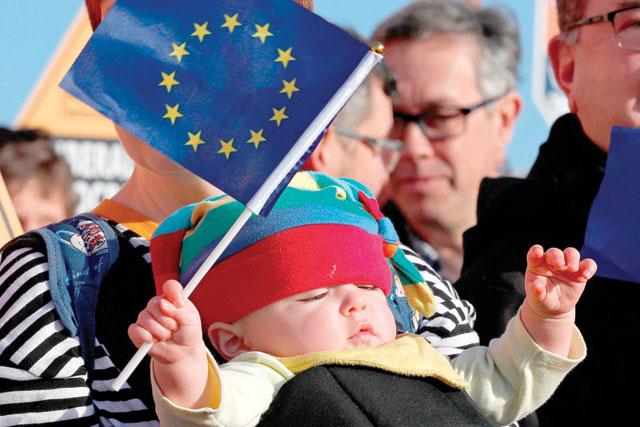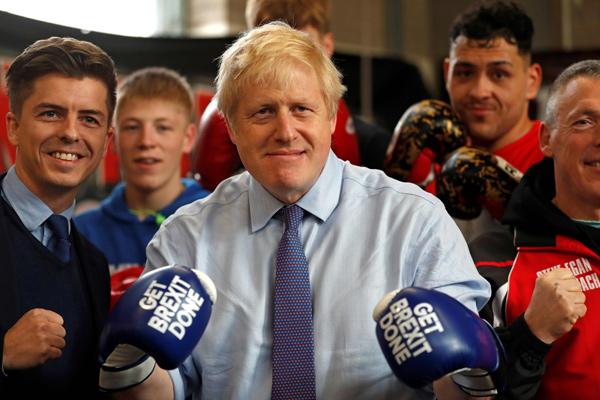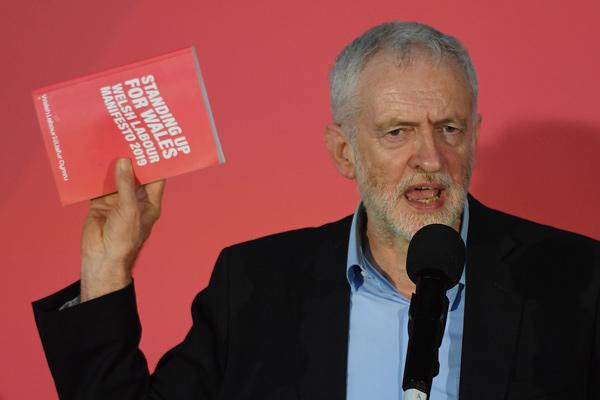You are here
Polls tighten on eve of Britain's Brexit election
By AFP - Dec 11,2019 - Last updated at Dec 12,2019

A Liberal Democrat supporter's baby holds an EU flag as they wait for the arrival of Britain's Liberal Democrat leader Jo Swinson at a general election campaign event at Esher Rugby Club in Esher, south west London, on Wednesday (AFP photo)
MIDDLESBROUGH, United Kingdom — Britain's political party leaders on Wednesday criss-crossed the country in a frantic last-minute push for votes, after polls predicted a tight finish to a highly-charged general election aimed at settling the long-running Brexit crisis.
Polls open on Thursday for the third time in four years in what is widely seen as a rerun of the 2016 referendum in which a narrow majority opted to leave the EU.
Parliament's splintered parties — some seeking broader independence and others wanting to keep Britain's European ties — repeatedly rejected the divorce terms former prime minister Theresa May struck with Brussels.
Her tearful resignation brought Boris Johnson into the fray with a vow to succeed where she had failed.
The former London mayor and foreign minister has spent the campaign hammering home a "Get Brexit Done" message aimed solely at winning a majority that could let him get the deal passed by the end of next month.
Hung parliament?
Yet a closely watched poll showed his Conservatives' lead over the main opposition Labour party led by Jeremy Corbyn narrowing.
The YouGov study showed the Tories on course for a 28-seat majority in the 650-seat House of Commons under Britain's first-past-the-post system.
It had forecast a 68-seat edge in a poll released on November 27.
"A Conservative majority is the most likely outcome but a hung parliament remains entirely plausible," said University of Kent professor Matthew Goodwin.
A result in which the biggest party does not command a majority raises the possibility of Brexit being delayed for years or even cancelled in a second referendum.
It could also end the political career of Johnson — a sharply polarising figure whose appeal to core Tory voters made him the logical choice to replace the increasingly hapless May.
“It could not be tighter,” Johnson said while helping to load milk bottles onto delivery vehicles while campaigning in northern England. “We’re fighting for every vote.”
‘Money in your pocket’
Turnout will be vital in Britain’s first December election in nearly a century. Rain and even snow are forecast for parts of election day.
Corbyn is a veteran leftist campaigner who confounded pollsters by coming within a whisker of winning the last election in 2017.
The teetotal socialist is pushing a radically left-wing programme to overhaul public services and “end austerity” caused by the global financial meltdown of 2008-09.
But his vague stance on Brexit and accusations of anti-Semitism in Labour have forced several top members out of the party and shadowed his campaign.
Corbyn told the undecided that they could vote for “hope”.
“We will put money in your pocket because you deserve it. The richest and big business will pay for it,” he said.
Corbyn’s proposal for Brexit is for Labour to strike a more EU-friendly agreement with Brussels. Voters would then choose between that deal and the option of staying in the bloc.
But Brexit remains a political liability for Labour. Corbyn has said as little as possible about the subject and steered attention toward the taxpayer-funded National Healthcare System (NHS).
Labour accuses Johnson of abandoning the principle of free treatment for all by potentially opening up the NHS to “Big Pharma” in a post-Brexit trade deal with US President Donald Trump.
Both Johnson and Trump deny the claims.
Permanent crisis
Polling suggests Corbyn stands almost no chance of winning the election outright.
Yet support from the pro-EU Scottish National Party (SNP) and the Liberal Democrats could still make him the first Labour prime minister since Gordon Brown in 2010.
SNP backing for a Labour coalition government could come at the cost of a promise to back a second referendum on Scottish independence.
The YouGov poll said the SNP was gaining momentum and on course to win 41 seats. But it projected just 15 seats for the Liberal Democrats.
Analysts believe the party made a mistake by initially promising to simply cancel Brexit.
“I don’t want Brexit of course, but we have to be pragmatic, it was a referendum, we have to abide by that,” Londoner Steve Banham told AFP.
The Lib Dems now promise to back a second referendum. But this stance makes them almost indistinguishable from Corbyn’s Labour.
Some potential voters voiced dispair at Britain’s political mess.
“Everyone thinks it’s all going to be over at the end of January if the Conservatives win but it won’t, it will just go on for years,” said voter Judy Wilkinson.
Related Articles
LONDON — Britain's Boris Johnson and Labour leader Jeremy Corbyn go head-to-head on Tuesday in their first TV debate of the election campaig
LONDON — The two men vying to be British prime minister in next week's election exchanged trademark blows on Friday over the familiar faultl
BRIDGE OF ALLAN, United Kingdom — Sonja Cameron's team of canvassers has been out on the streets of Bridge of Allan twice a week sinc













